

Company: How to have your e-learning designed internally calmly?
Designing e-learning has always been a headache for businesses. Entrusting the creation of e-learning modules to agencies can cost a fortune, buying modules off the shelf is often like trying to fit a square in a circle, and asking the training department to manage everything can quickly turn into a nightmare. The best option? Rely on your company's internal experts!
This seems logical: who better than your internal experts to know the specificities of your sector and the key skills to be developed? However, according to the ISTF 2024 barometer, only 30% of e-learning will be designed by these business experts...
And yes, despite its great potential, the task is not always a walk in the park. The main reason: business experts are rarely trained in educational engineering and are already juggling a thousand other tasks and running out of time.
Fortunately, things are changing and new solutions are now coming to simplify things. Thanks to intelligent tools and proven methodologies, it is now possible to transform your business experts into training superheroes, without adding an insurmountable workload to them. We explain to you how.
1. Why entrust the design of its e-learning to its internal experts?
Relying on your internal experts to design e-learning has several strategic advantages. Not only do they have in-depth knowledge of topics specific to your business, but they also understand the daily challenges your teams face. This expertise is crucial for creating relevant and impactful e-learning modules.
The key benefits
- Reduced cost : By avoiding outsourcing the design to external agencies, you make significant savings. E-learning agencies can charge high amounts to create tailor-made courses, while your in-house experts can often do this task at a lower cost. By using internal resources, you also avoid the hidden costs and time frames associated with external collaborations.
- Increased relevance : Off-the-shelf modules, while affordable, are often too general and do not meet the specific needs of your business. By involving your internal experts, you can develop training courses that are perfectly aligned with your goals and the realities of your sector. For example, a technical expert in a high-tech company will be better able to design detailed and technically accurate content than an external provider. This relevance results in a better assimilation of knowledge by learners, because the content is directly applicable to their professional daily lives.
- Responsiveness : Internal experts can quickly adapt training courses according to market changes or company needs. For example, if a new regulation comes into force, your experts can immediately update the training modules to ensure that your employees have the most up-to-date information. This ability to adapt quickly is essential in environments where change is constant, such as in the technology, finance, or health sectors.
Concrete examples
- Financial services company : A compliance officer can create training modules on new financial regulations. With his in-depth knowledge of laws and regulatory requirements, he can design accurate and up-to-date content, which is essential for staying compliant and avoiding sanctions. In addition, this type of training can be regularly updated to reflect legislative changes, thus providing ongoing and relevant training.
- Manufacturing sector : A production engineer can develop training on new safety procedures. Knowing the machines and the associated risks perfectly, he can create engaging and very specific modules that will reduce work accidents and increase the efficiency of operations. By including case studies and realistic scenarios, employees are better prepared to deal with real situations in the field.
- Technology and innovation : In a technology company, a project manager can develop training on new agile project management methodologies. His understanding of the specific challenges faced by development teams makes it possible to create adapted content that promotes the rapid and effective adoption of new practices. In-house training may also include practical workshops and Q&A sessions to reinforce learning.
2. The challenges of designing e-learning internally
While entrusting the design of e-learning to your business experts is a smart strategy, this choice is not without its challenges. Your experts are often specialists in their field, but instructional design is a completely different profession. Here are some of the common obstacles they encounter and how to overcome them.
Lack of teaching skills
Pedagogy is a science in its own right. It requires a thorough understanding of how people learn, strategies for structuring information in ways that are engaging and accessible, and techniques for evaluating learning effectively. Your business experts, while excellent in their fields, generally do not have this training. This can make the task of designing e-learning courses daunting.
Concrete example : A mechanical engineer can be great at explaining how machines work face-to-face, but structuring that explanation into an interactive e-learning module is a whole different story. He may find himself creating modules that are too technical and not very engaging.
Multiplicity of missions
Your business experts are not full-time trainers. They already have a significant workload, with responsibilities that include project management, customer support, team supervision, etc. Asking them to design e-learning modules in addition to their usual tasks can overwhelm them, reducing their effectiveness and motivation.
Concrete example : A product manager in a software company must not only manage product development but also answer customer questions, participate in strategic meetings, and now create training courses for new hires. This overload of work can lead to botched or incomplete training.
Complexity of educational engineering
Creating an effective e-learning course is about more than assembling content. This includes defining clear learning objectives, choosing the right training modalities (videos, quizzes, case studies, etc.), structuring the content logically, and ensuring that learners can assimilate and apply the knowledge they have acquired. It's a complex process that requires time and expertise.
Concrete example : A digital marketing expert may want to include a large amount of information in a module, thinking that it is essential for learners to know everything. However, without adequate structuring and effective teaching techniques, this can lead to cognitive overload for employees, making training ineffective.
How do we overcome these challenges?
To help your business experts overcome the obstacles of e-learning design, it is crucial to provide them with the right tools and resources. It is here that the LMS Didask and its educational AI intervene, offering essential support to simplify the module creation process.
- Step-by-Step Guidance : Didask's educational AI guides your experts through each design stage, absorbing educational complexity. Experts no longer have to worry about the technical aspects of pedagogy, as AI provides clear and structured recommendations for organizing content.
- Design automation : Didask makes it possible to automate a large part of the design process. From raw documents such as slides, PDFs or Word files, AI identifies essential concepts and proposes appropriate educational sequencing. This makes it possible to quickly transform dispersed information into a coherent and structured training module.
- Educational recommendations based on cognitive science : For each content granule, the AI recommends the most appropriate pedagogical modality based on cognitive science research. Whether it's an interactive quiz, an explanatory video, or a case study, etc., Didask chooses the most effective format to facilitate learning.
- Shaping and preparing granules : Once the granules are created and the teaching methods are defined, the AI formats these elements, making them ready for use for learners. This allows experts to focus on the content and not on the formatting or instructional structure.
Thanks to these functionalities, the Didask LMS solves both the problem of the lack of pedagogical skills and that of the lack of time. Your experts can thus focus on the substance of their subject, leaving the AI to take care of the technical and methodological aspects. We talk about the potential of AI in more detail in our articles LMS, AI and cognitive sciences, the winning e-learning jackpot and Beyond ChatGPT: Generative AI at the service of pedagogy
This is the challenge, for example, taken up by the company Pellenc, a manufacturer of agricultural equipment, which was able to entrust the design with confidence to these experts, and which he tells us about on video.
Conclusion
Using your business experts to design e-learning modules is a smart strategy. These experts know the specificities of your sector and the essential skills better than anyone. However, the challenges associated with pedagogy and time management are real and need to be addressed effectively.
This is where innovative solutions such as LMS Didask make all the difference. By automating complex aspects of instructional design and providing recommendations based on cognitive science, Didask allows your experts to focus on what matters most: content. This way, they can create high-quality courses without being overwhelmed by the technical aspects.
Investing in the right tools is not just about saving time and money. It is also a way to optimize the impact of your training, improve the return on investment and support the continued growth of your teams. By facilitating the task of your business experts, you transform them into true architects of training, capable of producing engaging and effective modules.
Stop letting educational complexity hold back your progress. With the right resources and technology, in-house e-learning design can become a smooth and rewarding process.
By adopting a thoughtful approach and using the right tools, your business experts can not only meet the e-learning design challenge but also excel in this mission.
On this subject of e-learning design, I also recommend our following articles:
- Creating an effective e-learning course: Steps and tips for ROI!
- What does digitalizing your training courses consist of?
- Developing and implementing online training: the guide to get started
- AI & eLearning design: I compared ChatGPT and Didask... the verdict is final!
- eLearning: 3 mistakes to avoid when starting out
Make an appointment directly with our eLearning experts for a demo or simply more information.
.png)











